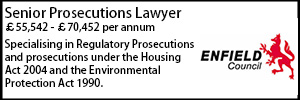Dog breeder wins appeal over variation to licence
The First-tier Tribunal has allowed an appeal by a Barnsley dog breeder against a council decision to vary her licence to prohibit the keeping of entire male dogs at her premises.
- Details
In Rebecca Latter v Barnsley Metropolitan Borough Council, the tribunal held that whilst the respondent council submitted there was “no choice” but to impose the restrictions to protect the welfare of the animals and this had been recommended by veterinary advice, this was “not proportionate and reasonable in all of the circumstances”.
The dispute arose after the council varied Ms Latter’s breeding licence on 20 September 2024, removing entire males from the licence following two accidental back-to back matings involving the same breeding female dog within 18 months.
Tribunal Judge Dwyer noted: “Regulations stipulate that a breeding female dog may only have 1 litter every 12 months, to avoid the health risks in back-to-back pregnancies. Therefore, the Respondent was satisfied that there had been a breach of the Regulations, and it was necessary to impose such a restriction on the renewal of her licence, that no entire male dogs can be kept at the licenced premises, to protect the welfare of animals.”
The appellant appealed on the basis that she had received a lack of advice from the council and apart from the two incidents, had an “exemplary record” and received positive reviews in inspections including the separation of the two sexes.
In response, the council submitted that although the structure of the appellant’s premises could have ensured effective segregation of male and female dogs at critical times, it was the day-to-day management of those areas that appeared attributable to the unwanted pregnancies.
Judge Dwyer said: “There is no dispute that the respondent had followed the correct process and had the power to impose the licence restriction. Therefore, the only issue for the Tribunal to determine was whether the Respondent had acted proportionately in imposing the restriction and whether it was reasonable in all of the circumstances.”
The local authority explained that after the second accidental mating they sought advice from a vet.
It was submitted that the council relied on the veterinary advice in imposing the restrictions which was a “lesser option” than refusing the licence or imposing a penalty in recognition of the appellant’s good standards, apart from the two incidents.
The veterinary advice was provided to the appellant and the Tribunal at the hearing, at the Tribunal’s request.
The Tribunal considered that the veterinary advice was not as described in the written or oral evidence to the Tribunal.
Judge Dwyer said: “The vet actually advised that the appellant would need to present a plan of how she intends to prevent this welfare problem from recurring. It may require a further inspection at her expense to ensure compliance is practical and likely to be effective. The advice to vary the licence to refuse to allow entire males to be kept on the premises was only advised, if the situation repeats.” (judge’s emphasis).
He found that the appellant was not given an opportunity to present a plan and the respondent went on to vary the licence without further input from the appellant.
Allowing the appeal, the tribunal concluded: “The Appellant has a consistent approach to animal welfare and the incidents were isolated and exceptional in nature and the Appellant has put forward reasonable proposals as how to mitigate this in the future. She will no longer look after unfamiliar male dogs on the premises and will need to find arrangements for the entire males if she is not going to be at the property. The Tribunal considers that it is highly unlikely the Appellant will allow the situation to repeat, on the evidence submitted to the Tribunal.
“Whilst the Respondent submitted there was no choice but to impose the restrictions to protect the welfare of the animals and this had been recommended by veterinary advice, the Tribunal finds that this was not proportionate and reasonable in all of the circumstances.
“[…] If the situation were to repeat, then at that stage, the appropriate course of action would be to either remove the licence or impose the restriction to vary the licence to not include entire males at the premises, in accordance with the veterinary advice received by the Respondent. The Tribunal is following and implementing the veterinary advice in this decision, which was purported to be done by the Respondent in making the decision.”
The Tribunal ordered that the licence be renewed without the restrictions imposed by the council.
Lottie Winson
Trust Solicitor (Public & Healthcare Law)
Trust Solicitor (Employment & Contract Law)
Locums
Poll



























